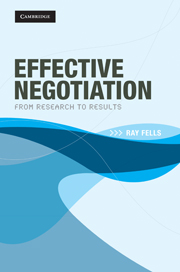Book contents
- Frontmatter
- Contents
- Acknowledgements
- 1 An introduction to negotiation
- 2 The essence of negotiation
- 3 Being strategic
- 4 The process of negotiation
- 5 Managing a negotiation
- 6 Dealing with differences
- 7 Exploring options
- 8 The end-game exchange
- 9 Negotiating on behalf of others
- 10 Cross-cultural negotiations
- Appendix 1 A preparation checklist
- Appendix 2 A negotiation review checklist
- Appendix 3 Self-reflection tools
- Appendix 4 The Strategy Framework
- Appendix 5 The Nullarbor Model
- Appendix 6 Managing competitiveness
- Appendix 7 Managing workplace negotiations
- Appendix 8 Managing a business negotiation
- Appendix 9 A culture checklist
- References
- Index
6 - Dealing with differences
- Frontmatter
- Contents
- Acknowledgements
- 1 An introduction to negotiation
- 2 The essence of negotiation
- 3 Being strategic
- 4 The process of negotiation
- 5 Managing a negotiation
- 6 Dealing with differences
- 7 Exploring options
- 8 The end-game exchange
- 9 Negotiating on behalf of others
- 10 Cross-cultural negotiations
- Appendix 1 A preparation checklist
- Appendix 2 A negotiation review checklist
- Appendix 3 Self-reflection tools
- Appendix 4 The Strategy Framework
- Appendix 5 The Nullarbor Model
- Appendix 6 Managing competitiveness
- Appendix 7 Managing workplace negotiations
- Appendix 8 Managing a business negotiation
- Appendix 9 A culture checklist
- References
- Index
Summary
The previous three chapters considered the issue and process aspects of reaching agreement. Chapter 3 outlined the issue strategies available to negotiators at any point in time – they can contend, concede, compromise in a creative or clear-cut way or they can walk away from the negotiations. Being strategic in negotiation involves analysis before action. Chapter 4 suggested that the process, irrespective of the preferred issue strategy, is going to involve the parties in at least two key tasks: differentiation and exchange, and hopefully a third: exploration. When negotiators focus on each of these tasks for a period of time, they become a phase in the negotiation en route to agreement. Negotiators tend to work to a script or imagery of how a negotiation unfolds and Chapter 5 showed one such imagery – the Nullarbor Model – as an example. The purpose of this and the next two chapters is to fill in the details using the issue, process, action and outcome framework presented at the end of Chapter 4. All three are ‘how to’ chapters.
Negotiation is a process where two parties with differences which they need to resolve are trying to reach agreement though exploring options and exchanging offers. The negotiators are likely to focus on the task of sorting out their real differences and why they need to be settled towards the beginning of the negotiation. The essence of this task is shown in Figure 6.1.
- Type
- Chapter
- Information
- Effective NegotiationFrom Research to Results, pp. 89 - 103Publisher: Cambridge University PressPrint publication year: 2009



